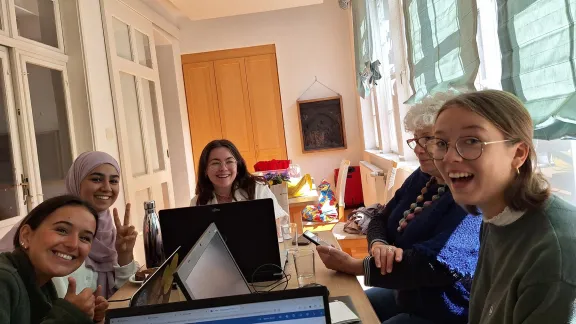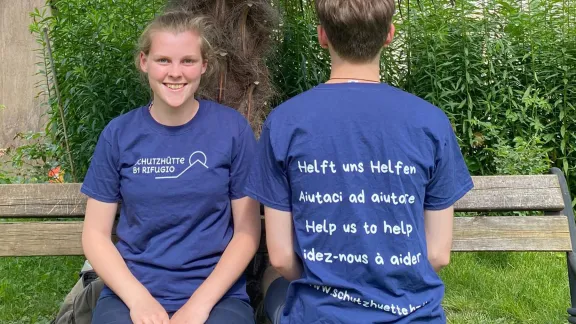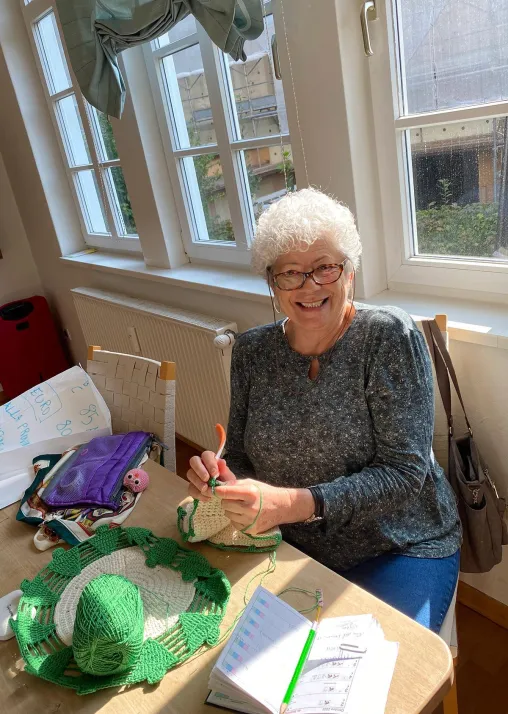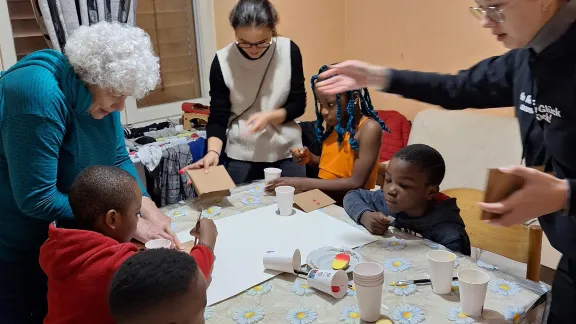
Staff and volunteers of the LWF-supported Schutzhütte B1 Rifugio in Bolzano, Italy. The association provides emergency accommodation and finds job opportunities for women migrants and refugees. Photo: Schutzhütte B1 Rifugio
Italian Lutheran church supports migrant families to find housing, work and foster community
(LWI) – What happens to women living with disabilities, who arrive alone in a new city and are unable to carry out the normal activities to earn a living because of their limitations? In Italy’s northern city of Bolzano, the Schutzhütte B1 Rifugio association “accompanies them on their path toward inclusion” until they “no longer need us as companions.”
As indicated in its German and Italian name, providing emergency shelter, protection and other forms of support to people at risk of homelessness in everyday life are the core objectives of the association, which is linked to the Evangelical Lutheran Church in Italy. Established in 2017, Schutzhütte B Rifugio traces its origins to spontaneous initiatives by volunteers responding to the 2015 influx of stranded migrants at the Bolzano train station, who were seeking to travel farther north in South Tyrol province.
The shelter association receives financial support from individuals, local businesses and organizations including The Lutheran World Federation (LWF) through its Member Church Projects program.
“As we cannot meet everyone’s needs, even if they are all legitimate, we have decided to focus our support on people in need of protection and provide them with accommodation. For us, this includes single women, who are unfortunately not covered by the law,” noted Ms Caroline Hohenbühel, a founding member of the association who serves on its board.
We have decided to focus our support on people in need of protection and provide them with accommodation.
Ms Caroline Hohenbühel, Schutzhütte B1 Rifugio

Photo: Schutzhütte B1 Rifugio

Ms Eliana Muraro leads a crocheting session at the Schutzhütte B1 Rifugio shelter. Photo: Schutzhütte B1 Rifugio

Volunteers and staff engage children in different activities including games, painting, baking cookies and preparing for festivities. Photo: Schutzhütte B1 Rifugio
*Gift, who lives with a cognitive disability is among those who found refuge with the emergency shelter association. Originally from Nigeria, the young woman’s social support system had expired when Schutzhütte B1 Rifugio welcomed her during the 2021 Christmas season. Although she wanted to be independent and no longer rely on constant assistance, she needed help to perform most daily activities. After supporting her for 18 months, she was finally assigned a place in a workers’ hostel and access to sheltered employment, a move that brought immense excitement to Gift. But for the B1 Rifugio 1 team, “a bitter aftertaste clouds the joy of Gift’s step toward autonomy.” How can those who are demonstrably impaired live independently in Bolzano, when sheltered workplaces are barely able to pay for their livelihoods, and have no one to help them?
Others like *Nataliia have settled in Bolzano. The Ukrainian lawyer and her son fled the war back home, and they were first accommodated in an apartment owned by the Italian Lutheran church. She now works in the catering industry and her son attends secondary school. Her goal is to stay in Bolzano in the long term.
Connected through crocheting
Schutzhütte B1 Rifugio also offers spaces for women to share experiences about their current concerns, traumatic issues in the past, and how to build resilience and focus on new goals and perspectives. In one activity, Ms Eliana Muraro, a volunteer in social services, invites women to sessions in crocheting.
Muraro herself came to South Tyrol from Brazil many years ago and has been involved in several campaigns to help refugees and migrants. “We got together to create beautiful works of art,” she remarked, showing the dolls and coasters they had made. “Even though each of them learned or did it differently, they were literally connected through yarn. They got to know each other while crocheting, and over tea and many hours spent together they felt that this activity unites them,” she added.
“We wanted to offer women who are going through a difficult phase in their lives and are unable to work a meaningful activity with this crochet project. Community is good. They got to know other women, exchanged ideas, spoke Italian and German together, learned from each other and experienced a sense of purpose by doing things together,” noted Ms Julia Kuppelwieser a staff of the association.
More asylum seekers
In 2023, nearly 160 people contacted Schutzhütte B1 Rifugio, and the association found accommodation for 70 people, including 31 women and 18 children in apartments in Bolzano, and temporarily in a church parish hall. The average stay before finding more permanent accommodation and work ranged from six to 18 months, with support extending to essential expenses such as medical care and childcare. Those seeking assistance came from 18 countries including Afghanistan, Iran and Pakistan; countries in West, North and Horn of Africa; Central Eastern Europe, and from Italy.
In addition to emergency shelter for vulnerable groups, the association’s activities in 2024 focus on defending the rights of those seeking international protection and legal assistance especially for single women. It also prioritizes finding work and stable housing for individuals, organizing educational and cultural courses, and awareness raising campaigns on human rights and refugee issues.
*First names used for protection.


